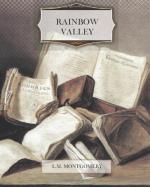“That makes me hungry,” said Jerry.
“We had only bread and molasses for supper and cold ditto for dinner,” said Una plaintively.
Aunt Martha’s habit was to boil a large slab of mutton early in the week and serve it up every day, cold and greasy, as long as it lasted. To this Faith, in a moment of inspiration, had give the name of “ditto”, and by this it was invariably known at the manse.
“Let’s go and see where that smell is coming from,” said Jerry.
They all sprang up, frolicked over the lawn with the abandon of young puppies, climbed a fence, and tore down the mossy slope, guided by the savory lure that ever grew stronger. A few minutes later they arrived breathlessly in the sanctum sanctorum of Rainbow Valley where the Blythe children were just about to give thanks and eat.
They halted shyly. Una wished they had not been so precipitate: but Di Blythe was equal to that and any occasion. She stepped forward, with a comrade’s smile.
“I guess I know who you are,” she said. “You belong to the manse, don’t you?”
Faith nodded, her face creased by dimples.
“We smelled your trout cooking and wondered what it was.”
“You must sit down and help us eat them,” said Di.
“Maybe you haven’t more than you want yourselves,” said Jerry, looking hungrily at the tin platter.
“We’ve heaps—three apiece,” said Jem. “Sit down.”
No more ceremony was necessary. Down they all sat on mossy stones. Merry was that feast and long. Nan and Di would probably have died of horror had they known what Faith and Una knew perfectly well—that Carl had two young mice in his jacket pocket. But they never knew it, so it never hurt them. Where can folks get better acquainted than over a meal table? When the last trout had vanished, the manse children and the Ingleside children were sworn friends and allies. They had always known each other and always would. The race of Joseph recognized its own.
They poured out the history of their little pasts. The manse children heard of Avonlea and Green Gables, of Rainbow Valley traditions, and of the little house by the harbour shore where Jem had been born. The Ingleside children heard of Maywater, where the Merediths had lived before coming to the Glen, of Una’s beloved, one-eyed doll and Faith’s pet rooster.
Faith was inclined to resent the fact that people laughed at her for petting a rooster. She liked the Blythes because they accepted it without question.
“A handsome rooster like Adam is just as nice a pet as a dog or cat, I think,” she said. “If he was a canary nobody would wonder. And I brought him up from a little, wee, yellow chicken. Mrs. Johnson at Maywater gave him to me. A weasel had killed all his brothers and sisters. I called him after her husband. I never liked dolls or cats. Cats are too sneaky and dolls are dead.”




